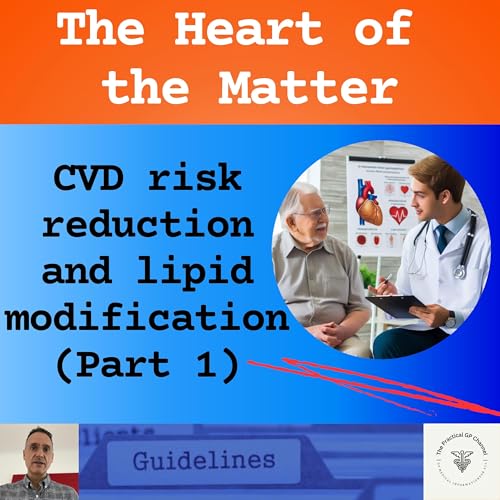For the introductory video on cardiovascular risk reduction and lipid modification: · https://youtu.be/jIhlkmOcsiI For the NICE guidance on cardiac chest pain video: · https://youtu.be/so97zARpmME For the NICE management of stable angina video: · https://youtu.be/BtWs0VHjp00 This episode makes reference to guidelines produced by the "National Institute for Health and Care Excellence" in the UK, also referred to as "NICE". Please note that the content on this channel reflects my professional interpretation/summary of the guidance and that I am in no way affiliated with, employed by or funded/sponsored by NICE. My name is Fernando Florido, and I am a General Practitioner in the United Kingdom. In this episode, I review the NICE guideline “Cardiovascular disease: risk assessment and reduction, including lipid modification” [NG238], published on 14 December 2023, focusing on what is relevant in Primary Care only. I cover CV risk assessment, recommendations for specialist referral and considerations before starting statin therapy. In the next episode I will cover the rest of the guideline including primary and secondary prevention, assessing response to treatment, optimising therapy and what to do when statins are contraindicated or not tolerated. For a refresher on the NICE guidance on cardiac chest pain and the management of stable angina, please refer to the corresponding episodes on this channel. The links are shown above. I am not giving medical advice; this video is intended for health care professionals; it is only my summary and my interpretation of the information consulted. You must always use your clinical judgement. There is a YouTube version of this and other videos that you can access here: The Practical GP YouTube Channel: · https://youtube.com/@practicalgp?si=ecJGF5QCuMLQ6hrk The resources consulted can be found here:The NICE guideline “Cardiovascular disease: risk assessment and reduction, including lipid modification” [NG238] Published: 14 December 2023 can be found here:· https://www.nice.org.uk/guidance/ng238The online version of QRISK3 can be found here:· https://qrisk.org/The QRISK3-lifetime tool can be found here:· https://qrisk.org/lifetime/index.phpThe NICE guideline on familial hypercholesterolaemia can be found here:· https://www.nice.org.uk/guidance/cg71The Simon Broome criteria for the diagnosis of familial hypercholesterolaemia can be found here:· https://www.nice.org.uk/guidance/cg71/evidence/full-guideline-appendix-f-pdf-241917811The Dutch Lipid Clinic Network (DLCN) criteria for the diagnosis of familial hypercholesterolaemia can be found here:· https://www.mdcalc.com/calc/3818/dutch-criteria-familial-hypercholesterolemia-fh Intro / outro music: Track: Halfway Through — Broke In Summer [Audio Library Release] Music provided by Audio Library Plus Watch: https://youtu.be/aBGk6aJM3IU Free Download / Stream: https://alplus.io/halfway-through TranscriptIf you're listening to this podcast on YouTube, for a better experience, switch to the video version. The link is in the top right corner of the video and in the episode description.Hello and welcome, I’m Fernando, a GP in the UK. Today, we’ll look at the NICE guideline on cardiovascular risk reduction and lipid modification, or NG238, which was published in December 2023, focusing on what is relevant in Primary Care only. In this episode we are going to cover CV risk assessment, recommendations for specialist referral and considerations before starting statin therapy. Stay tuned because in the next episode we will cover the rest of the guideline including primary and secondary prevention, assessing response to treatment, optimising therapy and what to do when statins are contraindicated or not tolerated. If you’d like a refresher on the NICE guidance on cardiac chest pain and the management of stable angina, please refer to the corresponding episodes on this channel. The links are also in the episode description. Right, let’s jump into it.For people without established cardiovascular disease, we are now advised to use QRISK3 instead of QRISK2 to calculate the CV risk within the next 10 years. We will do this for those aged between 25 and 84, including those with type 2 diabetes.Because QRISK2 is currently embedded in the electronic clinical systems that most of us use in the UK, NICE accepts that, until the clinical software systems are updated with QRISK3, it may be necessary to continue using QRISK2.However, when assessing the CV risk for people taking steroids or atypical antipsychotics or people with SLE, migraine, erectile dysfunction or severe mental illness, we are advised to use the online version of QRISK3, because QRISK2 does not take these risk factors into account and may underestimate the risk. A link to the online version of QRISK3 is in the ...



